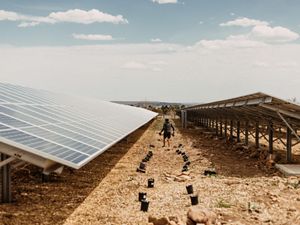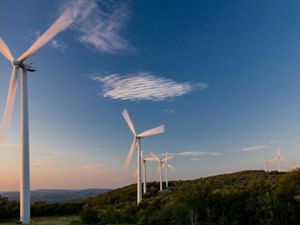Colorado Governor Signs Bill to Provide Resources for Local Governments to Site Renewable Energy Projects and Protect Wildlife
Media Contacts
-
James Quirk
WRA
Phone: 9089023177
Email: james.quirk@westernresources.org -
Lindsay Schlageter
The Nature Conservancy
Phone: 6129683141
Email: lindsay.schlageter@tnc.org
The Colorado Renewable Energy Siting Coalition today celebrated the signing of Senate Bill 24-212 (Local Govs Renewable Energy Projects) by Colorado Gov. Jared Polis. This bill provides resources to local governments to assess, site and permit utility-scale renewable energy projects while considering community values, including impacts to lands and wildlife.
Colorado has long been a climate leader, and currently ranks seventh in per capita renewable energy production. To hit its goal of 100% renewable energy by 2040, the state will require an estimated three-fold increase in wind generation and a five-fold increase in solar generation. Surveys of Colorado residents continue to reinforce broad interest in diversifying our state’s energy production sources with more renewable resources while simultaneously protecting wildlife and other community values. Local governments, industry and state agencies need to collaborate and move quickly to site and permit renewable energy projects while avoiding, minimizing and mitigating impacts to wildlife and maximizing benefits for communities. SB24-212 takes a significant step to ensure state agencies provide local governments with the resources and expertise to responsibly develop utility-scale renewable energy projects.
SB24-212 directs Colorado Parks and Wildlife to maintain publicly available maps of habitats where utility-scale wind and solar development could adversely impact wildlife populations, and to update best management practices to avoid, minimize and mitigate impacts from projects in sensitive habitats. In addition, local governments are required to consult with Tribal Nations for projects proposed in the Brunot Treaty area where Tribes have hunting, fishing and gathering treaty rights.
The new law also directs the Colorado Energy Office (CEO) to develop a repository for model regulations that can serve as templates for local governments to adopt policies that support both renewable energy development and wildlife resources. Additionally, the bill directs the Colorado Energy and Carbon Management Commission to provide technical support for local governments updating their land use codes and assessing individual projects.
Between now and Sept. 30, 2025, CEO and the Department of Natural Resources will conduct a study to assess local government permitting processes to determine if counties have the infrastructure and resources available to site and permit renewable energy projects at the pace and scale necessary to meet Colorado’s renewable energy goals. The study also will assess the impacts of renewable energy on wildlife and steps taken to mitigate those impacts, as well as the use of community benefits agreements to ensure host communities see meaningful benefits from the project.
According to the State of the Rockies – Conservation in the West Poll, more than two thirds of Colorado voters prioritize the expansion of renewable energy over extractive energy sources and support the transition to 100% renewable energy. Furthermore, more than 80% of voters say the loss of fish and wildlife habitat is a “serious” problem, and more than 50% say it is an “extremely" or “very serious” problem. SB24-212 will ensure local governments have the resources and expertise necessary to evaluate and permit renewable energy development, protect wildlife habitat and center community voices.

“Utility-scale wind, solar and battery projects are indispensable for reducing emissions from Colorado’s grid, especially as the state has committed to sourcing 80% of its electricity from renewable sources by 2030 and achieving a fully decarbonized economy by 2050,” said Nelson Falkenburg, Clean Energy Siting Associate at CATF. “Direct engagement with communities coupled with state-level technical assistance is critical to overcome common hurdles to clean energy siting. This bill makes progress on both fronts, while paving the way for future reforms.”
“Across the West, people and wildlife are feeling the impacts of climate change. Audubon applauds Colorado’s proactive effort to approach utility-scale renewable energy development thoughtfully,” said Daly Edmunds, Director of Policy and Outreach at Audubon Rockies. “This is a proud day for Colorado. The State’s leaders have clearly stated—with the passage of this bill—that we can and must address climate change, have renewable energy done in a manner that minimizes impacts to wildlife and consider community needs.”
“Colorado has long been a leader in protecting nature and addressing climate change. SB24-212 is an important step to ensuring the state can reduce greenhouse gas emissions by building utility-scale renewable projects while protecting wildlife, important habitats and centering community voices,” said Severiano DeSoto, Energy Siting Policy Advisor at WRA. “Under the leadership of sponsors State Senator Chris Hansen, Senate President Steve Fenberg, Representative Karen McCormick, Representative Kyle Brown and Governor Jared Polis, Colorado is showing how we can fight both climate change and biodiversity loss without compromise.”
“Coloradans want strong economies; quality hunting and fishing traditions; affordable, reliable energy resources; and to protect community values for generations to come and we believe that is possible,” said Liz Rose, Colorado Field Representative for the Theodore Roosevelt Conservation Partnership.“ This new law is the first step to ensure local governments and the renewable energy industry have the technical resources they need to successfully design and permit lower-impact, higher-benefit renewable energy projects. TRCP looks forward to learning from the study results that come from this bill, and thanks the bill’s sponsors and state agency staff who invested a significant amount of time and energy to chart the course ahead.”
SB24–212 helps position Colorado to meet our clean energy goals in a way that balances climate, conservation and community priorities. Importantly, it keeps Colorado communities at the forefront of decision-making, while equipping them with the science-based informational resources and technical support necessary for balancing multiple priorities,” said Chris Menges, Director of Climate Action for The Nature Conservancy in Colorado. “By reducing the potential for conflicts, this bill helps create the enabling conditions we need for a swift & equitable clean energy transition. We thank Gov. Polis and the bill sponsors for their leadership in creating a better future for all Coloradoans.”
“SB24-212 is a step in the right direction for Colorado, demonstrating it’s not just possible but entirely feasible to support a clean energy transition and wildlife conservation” said Brien Webster, Public Lands Campaign Manager at Conservation Colorado. “This bill provides the resources and expertise needed to develop renewable energy responsibly across the state in a way that supports local communities, safeguards our natural heritage and strengthens our collective insights. We appreciate the leadership of the bill sponsors and Governor Polis for their leadership on this important issue.”
The Nature Conservancy is a global conservation organization dedicated to conserving the lands and waters on which all life depends. Guided by science, we create innovative, on-the-ground solutions to our world’s toughest challenges so that nature and people can thrive together. We are tackling climate change, conserving lands, waters and oceans at an unprecedented scale, providing food and water sustainably and helping make cities more sustainable. The Nature Conservancy is working to make a lasting difference around the world in 81 countries and territories (40 by direct conservation impact and 41 through partners) through a collaborative approach that engages local communities, governments, the private sector, and other partners. To learn more, visit nature.org or follow @nature_press on X.



